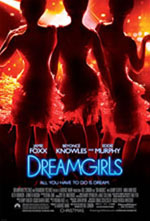
Amazing Grace
Babel
Charlotte's Web
Dream Girls
Into Great Silence
Last King of Scotland
Letters from Iwo Jima
The Namesake
Notes on a Scandal
See
2006 films
 DreamGirls A Review by Tom Condon, OP (St. Martin Province) Set in the turbulent early 1960s to mid-70s, Dreamgirls follows the rise of a trio of women - Effie, Deena and Lorrell - who have formed a promising girl group called The Dreamettes. At a talent competition, they are discovered by an ambitious manager named Curtis Taylor, Jr., who offers them the opportunity of a lifetime. Dreamgirls, as most everyone knows, is a musical loosely based on Motown record producer Barry Gordy and his creation of Diana Ross and the Supremes. This film, written and directed by Bill Condon, who also wrote the screenplay for the Oscar winning Chicago, was the most anticipated film of the holiday season. Unfortunately, the film is a disappointment. While it has its moments, it doesn’t make a successful transfer from stage to screen. It’s hard to say what happened. I think the main problem is that the most interesting character, Effie White, is pushed aside halfway through the film so that Deena Jones (the character based on Diana Ross) can take over as lead singer. Curtis Taylor (the character based on Barry Gordy) makes Deena the lead singer because she is more attractive and has a voice that he thinks will appeal to a crossover audience. Effie is more talented, but is heavier, more tempermental, and sings in a more soulful voice than Deena. So, Curtis dismisses Effie from the act, as well as from his lovelife, and replaces her with Deena. In the scene, about halfway through the movie, in which Effie is forced out, she sings a great song, “I’m Telling You that I’m Not Going.” Newcomer Jennifer Hudson belts out the song, full of shock, hurt, and anger, and she brings down the house. The audience in the theater where I saw the film broke out in spontaneous applause. I’ve heard that this reaction was not an isolated event. It’s a great scene, similar to Barbra Streisand belting out “My Man” at the end of Funny Girl. Unfortunately, nothing else works nearly so well in the film. Whereas the film, Chicago was all about cynicism and razzle-dazzle, Dreamgirls takes
itself very seriously. The many musical numbers come and go, but
they all start to blend together. Dreamgirls also tries
to chronicle the tumultuous decades of the 60’s and 70’s,
with images of Martin Luther King and riots in Detroit. Another recurring
theme is the prejudice in show business. Curtis is very limited in
his ability to sell records and book his acts. White audiences wouldn’t
accept most black entertainers. Curtis would eventually be very successful
marketing his carefully selected artists to a crossover audience.
But, his efforts come at a price both to himself and to his artists. Tom Condon, OP |
Winner! Best Supporting Actress, 2007 Academy Awards |
 Home | Contact Us | DLC Dominican Life | USA is sponsored by the Dominican Leadership Conference, the networking organization for elected leaders in the USA. Dominican Life | USA © 2002-2007, All Rights Reserved Web Editor: Anne Lythgoe, OP |
|---|

